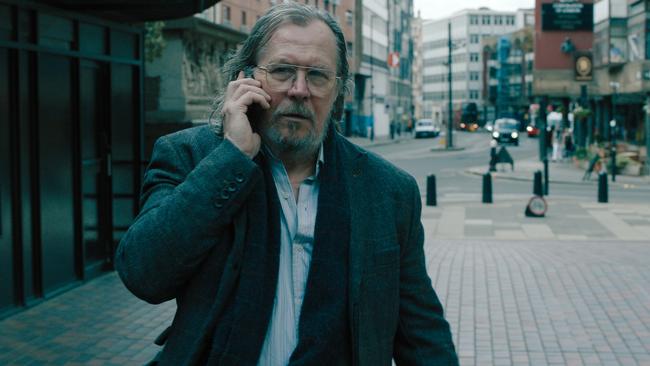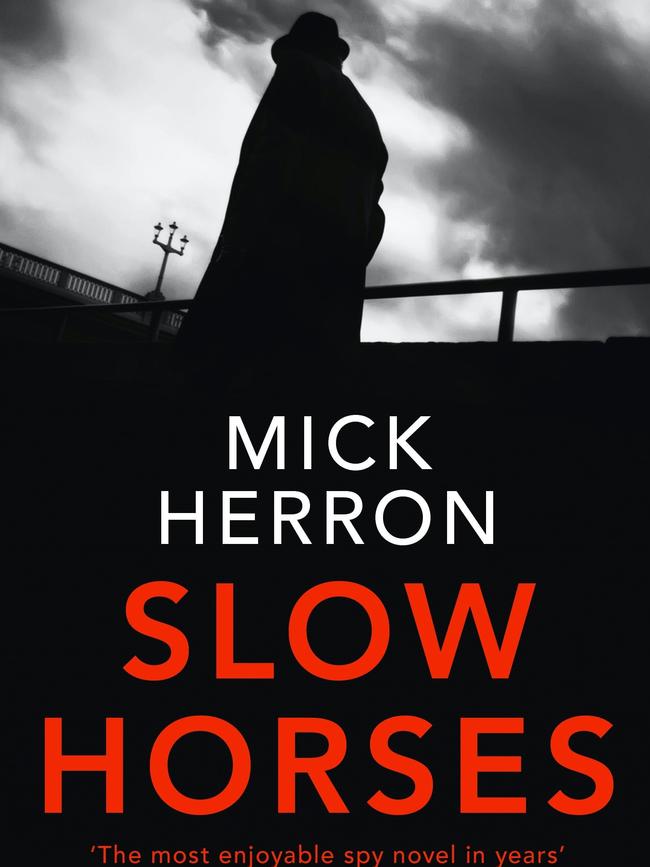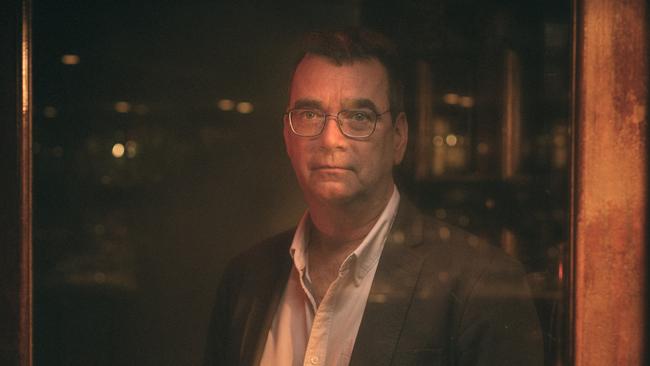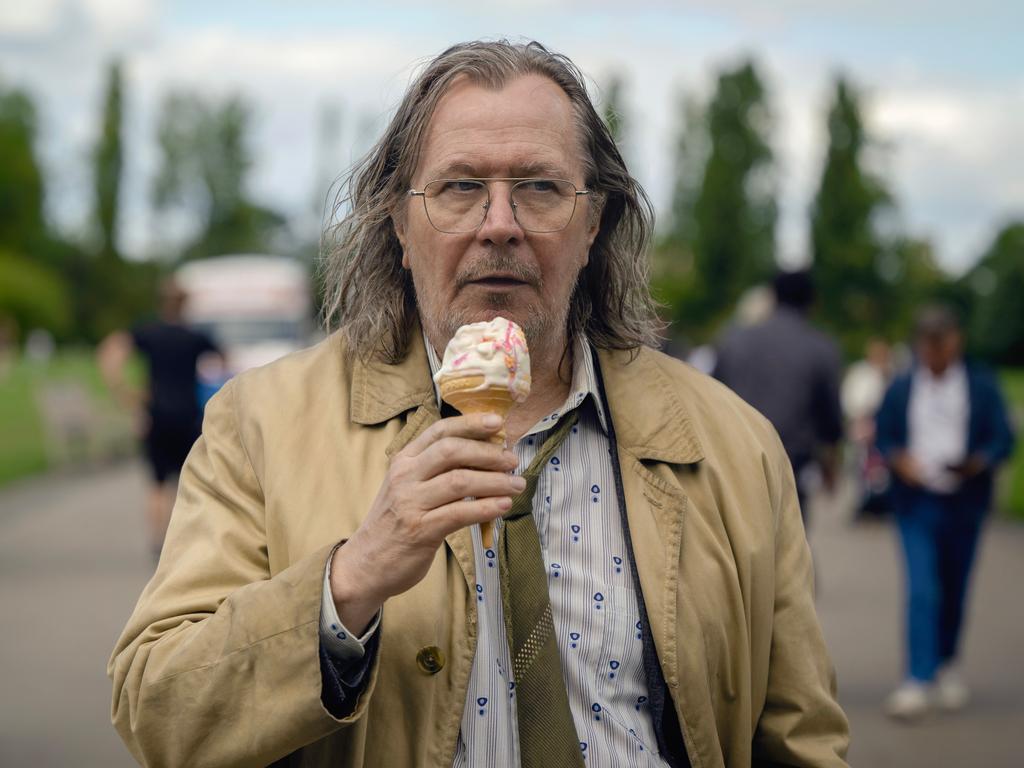Nobody was reading him. Now Mick Herron’s the world’s best spy writer
Mick Herron, the author of the Slow Horses series, is the unlikeliest star in publishing. Even he couldn’t have made this up.

How does a British spy novelist find himself in a honky-tonk?
Mick Herron, the author of Slow Horses, walked into a Nashville bar one night last week. He was visiting from Oxford, England, for a mystery and crime-fiction convention where fans treated him like a rock star.
These days, he has friends in high places, like the Apple TV+ show based on his popular books. He’s become so beloved writing about the worst spies that he’s now widely regarded as the best spy novelist since John le Carre.
All of which is pretty strange.
Because it wasn’t long ago that he was a spy novelist who nobody read. “I was only ever a hair’s breadth away from being exactly as much of a failure as the people I write about,” he said by Zoom from Nashville.
Before he was writing for readers around the world, Herron was an obscure author who mostly wrote for his own fulfilment. He published the first books of his blockbuster series while he was still working a humdrum desk job. And he was dropped by his publishing house because of meagre sales.
Since then, Herron’s books have sold more than four million copies.
If you’ve seen Slow Horses or read any of the eight spy thrillers in the series that Herron has been writing since 2010, you understand why.
They are brilliant, hilarious and unlike the other classics of espionage fiction – not the Circus of le Carre so much as The Office. Herron’s characters are bad spies and MI5 screw-ups exiled to a stable of misfits called Slough House, where they are desperate to escape life as so-called slow horses.
As it turns out, Herron can relate to the underdogs he created. He wasn’t planning to find success writing about failures. And until recently, he didn’t. It took a long time and circumstances beyond his control for his books to be discovered.
For all his obvious talent, the 61-year-old author became a literary sensation because of luck, chance events and the right people believing in him at crucial moments of his career, just like anyone who is successful in any field.
It all happened so incrementally – and slowly – that I asked Herron if he thinks about some alternate life where none of it ever happened.
“I spend quite a lot of time contemplating alternate lives,” the novelist said. “I’d like to think that the books would have found a way through one way or the other. Eventually. But it might have taken longer. And it might never have happened.” He paused. “I don’t know. I mean, I sometimes think I so easily could have been living in a bus shelter somewhere with a pile of unpublished manuscripts.”

When they were first published, his books were read by roughly the same number of people as his articles for a trade journal on British employment law.
“I wrote about people who were having a bad time at work, essentially,” said Herron, who was an editor at the Employment Law Brief. “And yes, you can certainly draw a lot of conclusions about how that influenced the books that I started writing when I was working there.”
Back then, he was commuting every day from Oxford to London. He came to work early so he could leave early. When he got home around 6pm, he had the energy to write for an hour. By aiming for 350 words a night, he pumped out five well-reviewed detective novels. But they “hadn’t set the world alight,” as he puts it, and they weren’t nearly successful enough for him to write full time. So he kept commuting.
When he started his job, Herron had an office on a floor with only a few people. By the time he left 15 years later, he was reserving a different hot desk every day on a floor with a few hundred people. Which taught him a valuable lesson that would animate his spy fiction.
“The larger the organisation was that I worked for,” he said, “the less concern it had for the people working for it.”
His literary interests shifted after July 7, 2005, when being in London for the suicide bombings made him want to write about the security services. The problem was that he knew precisely nothing about the security services. What he did know was that the bigger an organisation gets, the more dysfunctional it becomes.
“This was a truth that surely applied as much to the intelligence services as to any other place of work,” Herron later wrote. “And if every organisation has its failures – its second-raters – wouldn’t that be well inside my comfort zone?”
He began writing his first novel about second-rate spies and felt as though he finally had momentum. But once Slow Horses came out in 2010, his publisher disagreed. It decided to stop publishing him.

“I would have said exactly the same thing,” Herron said.
“Why are we publishing this? Nobody’s buying it.”
He was already planning to dump that publisher when it dropped him because it wasn’t selling his books the right way, he says. I asked him if he felt spiteful or jilted — or if he just put on a cup of tea and kept writing.
“I don’t drink tea,” he said, “but I did keep writing.”
Herron couldn’t get others in the UK to bite on the next Slough House title, Dead Lions, since there wasn’t much demand for a sequel to a book that nobody was buying.
Then his agent reached out to Soho Press with a request. The independent publishing house in New York with a crime imprint had recently ended its deal to distribute his British publisher’s books in the US. Would it consider publishing Herron directly?
Soho editor Juliet Grames hadn’t read Slow Horses when she did her diligence and started reading the manuscript for Dead Lions. She quickly walked over to her boss’s office and declared: We have to publish this.
“We published this beautiful, amazing book,” Grames said. “And not a lot happened.”
By that point, Herron was used to not a lot happening.
“I accustomed myself to the idea that I was never going to be a bestseller,” he said. “I wasn’t looking for anything other than seeing my books on the shelf really – on my shelf, if nobody else’s.”
But then stuff began to happen for Herron.
After Soho bought the world rights to Dead Lions and saved his career, his new US publisher nominated him for the British Crime Writers’ Association’s best novel of 2013. Even when he was named a finalist, Herron figured his odds of winning the Gold Dagger were similar to his odds of winning an Olympic gold medal.
He thought an invitation to the ceremony would be the highlight of his writing career, so he was completely gobsmacked when he went home with the top prize. His sales picked up. He became a cult favourite. And before he had a British publisher, a British production company called See-Saw Films optioned the television rights for his books.
But they weren’t exactly flying off the shelves. In fact, Herron kept his day job until January 2017.
The month he quit, something else happened that would change Herron’s life: Nancy Pearl, a librarian based thousands of miles away in Seattle, raved about Slow Horses on National Public Radio. By then, the book was seven years old. To meet the sudden demand, Soho reprinted 2000 copies. They were gone by the end of the day. By the end of the month, Soho had sold another 20,000 copies – more than the previous seven years combined.
Today, the Slough House novels have sold well over a million copies in the US, and Herron is Soho’s top-selling author.
The whole thing was so improbable and wildly unexpected that when other writers ask him for advice, he offers two words.

“Be lucky,” he says.
“You can have everything else going for you. But without a stroke of luck along the way, you might never really make it.”
Back at home, Herron caught another lucky break in 2014 when an editor named Mark Richards happened to be walking through Liverpool Street station and noticed his book for sale. Richards wondered what this American paperback was doing on a shelf in the middle of London’s busiest train hub.
With his curiosity piqued, he picked up Slow Horses. He was intrigued by the epigraph, a line from a John Berryman poem, and he was hooked by the first sentence:. “This is how River Cartwright slipped off the fast track and joined the slow horses.”
He bought it, read it, loved it and thought: maybe other people would, too. He contacted the author, took him for lunch and acquired the rights to the Slough House novels for an imprint of Hachette UK.
And that was how Mick Herron rejoined a British publishing house.
It reissued the first two books and experimented with several new covers before settling on the ominous, black-and-white look of spy canon.
For the release of the next one, the imprint relaunched the author himself and pitched literary tastemakers to champion him.
One of Herron’s biggest fans was the chief executive of the publishing house, who invited James Daunt, the head of Waterstones, Britain’s largest bookstore chain, to lunch at an especially nice restaurant.
“Which meant that he wanted something,” Daunt says.
“As it happens, it was no more than for me to read a novel he loved and thought could be given another chance to shine.”
That novel was Slow Horses, which Waterstones picked as its Thriller of the Month in August 2017, a full seven years after it was published.

Then it was off to the races. The compulsively readable Slough House novels and other books in the Mick Herron universe have now sold three million copies for his British publisher. They have what his American editor calls “statistically abnormal stickiness”.
“If you read the first one,” Grames said, “you’ll read the second one.”
Many, many more people are reading those books with flashier covers in America because of the Apple TV+ series, which started its fourth season this week and features Gary Oldman as the gruff, unforgettably flatulent Jackson Lamb.
Not even Herron could have imagined any of this: the honky-tonk, the book sales, the hit show with a theme song by one of his readers – an actual rock star named Mick Jagger.
It still feels to him like something that happened to someone else.
But that’s the thing about slow horses. Sometimes they’re just running at their own pace.
“The main lesson I’ve taken away from this is that if you’re only going to be successful in one half of your career, make it the second half,” Herron said. “If it’s the first half, that’s a tragedy. But the second half is a happy ending.”
The Wall Street Journal
Season 4 of the Slow Horses TV series is now streaming on Apple TV+.



